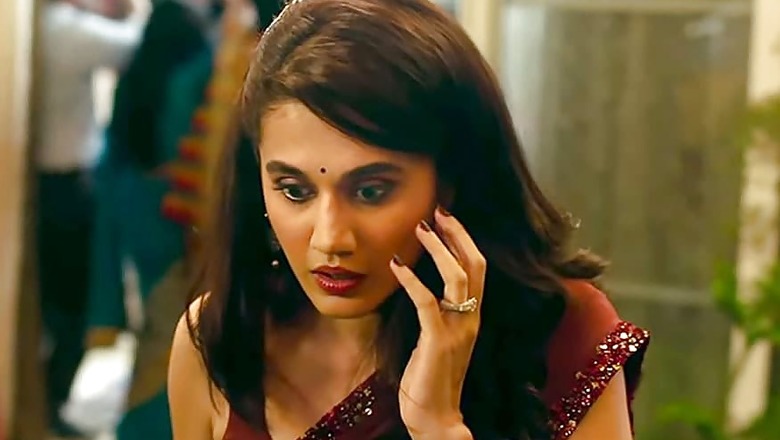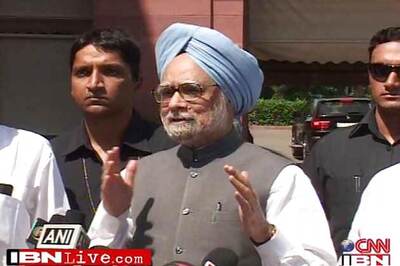
views
Anubhav Sinha, who has from the last couple of years, re-invented himself as a filmmaker with two groundbreaking films Mulk and Article 15, is back with Thappad, a film that sheds light on another important social issue- domestic abuse. The director has once again collaborated with Taapsee Pannu with an ensemble cast consisting of names like--Ratna Pathak Shah, Dia Mirza, Kumud Mishra, Tanvi Azmi, Geetika Vidya Ohlyan, Pavail Gulati, Ram Kapoor among others.
In Thappad, Taapsee essays the role of Amrita, a homemaker who walks out of her marriage after her husband slaps her at a house party. In the film, Amrita is seen trying to hold her fort, while the society tells her to forgive and forget.
Taapsee's Amrita is a glimmer of hope, even when her eyes look tired and everybody around tells her she is wrong. Thappad comes off as a revolutionary piece of work as it tells a woman to not tolerate even the very first instance of abuse. If that isn't a commendable message, we don't know what is.
A film like Thappad might, unfortunately, resonate with thousands of real women, hence it was important to understand their grievances. To assess the ground reality of abuse and its impact on women, we spoke to legal and medical professionals.
Talking about the long-term psychological effects of abuse on a survivor, Mumbai based psychiatrist Dr Manjiri Deshpande Shenoy explained the kinds of abuse and how it impacts a woman. She said, "First of all, abuse is of different types. Generally, people link abuse as only physical. The movie is related to physical abuse. But on various levels, if you see it can be of different types such as sexual, emotional and neglect as well. Neglect means that you’re not taking care of someone is also a type of abuse ideally. All these forms of abuse leave a scar on an individual. What happens is generally women get abused more, especially in a marriage. But there are also cases when men are abused too. But generally, we talk about women getting abused more that is more common.
"We see patients with depression, anxiety, a condition called post-traumatic stress disorder, which is repeated flashbacks or memories of the event which has happened some time ago. When we examine them and talk to them, it boils down to - it started from the abuse. Maybe they are still in the same marriage or same relationship because somewhere there is a feeling of dependency. Some women are still not strong that they can get out of the marriage because they have been abused. What happens, the perpetrator gets into a dominant authority like ‘I have done it once, I can do it again'."
"Ideally even a slap, even pushing, hitting, etc is obviously some form of abuse and should not be tolerated by any woman. But if you look at it, the slap may have a lot of things underneath it also. There may have been a lot of incidents that have either led to the slap or the woman has woken up with this slap in retaliation. I saw the trailer in which it said that it opened her eyes to things which she had put a blind eye to all these years. That kind of evoked all the things that she had been facing all these years. Right from neglect to some form of emotional abuse. Finally, the physical episode hits her hard and that’s when she decides to retaliate," she added.
When asked about what mental health professionals can do in case a woman asks for help, she said, "As a mental health professional, what I will do is, first of all, make sure to hear her out, let her ventilate to make sure she is okay. We are not from the law background so it is not right for me to tell her if she has to divorce, ultimately it is her decision. But whatever decision she takes, we have to make sure that she is supported in that. She has probably lost her confidence. They are very vulnerable now to develop depression, PTSD, anxiety, substance abuse also in some cases. Our role is to see how badly she is affected, keep a watch on that and treat whatever condition she is coming to us with."
Talking about how women are often forced to live in loveless and abusive marriages, Dr Manjiri said, "Unfortunately, that’s where our Indian judiciary system is also failing as it says that you have to suffer a lot to get divorced, which is so sad. The woman is saying that it has hurt her, scarred her and the law is saying that it is not enough reason to divorce. How unfair is that? How is the law going to decide if it was a big event or a small event?"
Speaking further to Mumbai-based advocate Rabindra Hazari said, we found that legally the situation is much grimmer. While the trailer of Thappad shows Amrita's pursuit of divorce, in reality, it is a difficult process.
Elaborating about the situation in real life, he said, "When you go for a divorce, you have to make out grounds for divorce under the law whereby the couple had got married. In the case of Hindus, the relevant grounds for divorce are set out in Section 13(1) of the Hindu Marriage Act. As per Section 13(1)(i-a), cruelty is one of the grounds for divorce. However, the cruelty should be of a grave character. Cruelty can be physical or mental and now under the Domestic Violence Act, you also have different kinds of abuse including economic, emotional and sexual abuse.
However, as per the reported facts, there is only a solitary slap, without any history of previous abuse or cruelty. So on the basis of this, it is extremely doubtful whether this would constitute cruelty under Section 13(1)(i-a). Moreover, you have a system of counselling in the Family Court, the counsellor has to give a report to the judge before the judge takes the matter that the former has met both the parties and tried to settle the matter. This report of the counsellor as per the Family Court Act and Rules, is a secret, confidential document that cannot be viewed by the parties. But the judge gives the report a lot of importance. The counsellor gets to the heart of the matter between the two parties, regardless of what they are pleading in court as per legal advice. Therefore if it is just a solitary slap, without there being a history of abuse or cruelty, it would be difficult to obtain a divorce on the basis of a solitary slap under Section 13(1)(i-a)."
To understand more, we also spoke to a marriage counsellor and psychotherapist.
Mumbai's Dr Ali Ghabrani detailed about what happens when a couple goes to counselling. "If one slaps their wife that is not enough reason to grant a divorce. And if you file for divorce, it will not be granted in one day. According to the protocol, they have to go to a counsellor and the counsellor will give you an anger management program. They will understand you, mediate things between both the parties, saying that what happened should not happen repeatedly. Once the man knows the legal implications of hitting their wife they also become aware and cautious of not doing so. Normally in counselling, we try to mediate and patch up couples. We tell them what their weaknesses are. If their weakness is that they cannot control their anger, we tell them to convert their weakness into strength, we tell them not to be reactive but responsive. If you are responsive you will understand what not to do," he said.
However, Dr Manjiri has hope that films like Thappad will be the first step on the path of change. "Films like these (Thappad) should be made because more than anything, it invokes conversation. After Pink, there were conversations happening around rape and people were aware of it. I don't think people read newspapers as much but people are definitely attracted to films. Taapsee being in this film obviously makes a difference. People will go for her more. They may not take the message but there will be conversations in colleges, schools, among young people. We also will get to know their views about this. Finally, a revolution happens only when conversation happens. Regarding mental health also, unfortunately, the conversation is not that common and that is why it is still a stigma and when we talk about it we are destigmatising the topic. More films like this have to be made."
Follow @News18Movies for more



















Comments
0 comment